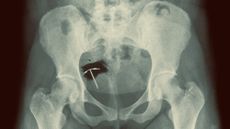The great departure: Texas OB-GYNs are leaving the Lone Star State
The state is suffering an exodus of health care professionals, creating more maternity-care deserts


After the U.S. Supreme Court overturned Roe v. Wade, Texas joined a list of states that passed highly restrictive abortion laws. The state's near-total abortion ban made performing an abortion a crime punishable with up to life in prison. The details of the ban encourage Texas' citizens to file lawsuits against medical professionals who do so. Despite having exceptions in the case of life-saving care, the shift created a field of uncertainty for doctors and patients alike. As a result, some OB-GYNs are fleeing the state or retiring early, and potential residents are avoiding Texas altogether.
'A quiet sense of doom'
A recent survey from healthcare consulting firm Manatt Health showed that the abortion laws passed in Texas after the fall of Roe v. Wade are "stressing the state's already beleaguered OB-GYN workforce" and "threatening the pipeline of new doctors that would help provide relief," said The Texas Tribune. More than 70% of practicing OB-GYNs in Texas feel the near-total ban has "negatively impacted their work, prohibiting them from providing high quality, evidence-based care for their patients." The majority of OB-GYN medical residents said the abortion laws weigh heavily on their decision to stay in Texas after they finish their training. Nearly 15% of surveyed doctors said they were planning to retire early, which could "accelerate the state's looming shortage of OB-GYNs."
By 2030, the state is expected to have "15% fewer OB-GYNs than is needed to keep up with demand." Many rural areas throughout the state have already begun to "feel the effects of these shortages." Over 45% of Texas counties are already considered "maternity-care deserts," which means there is "no doctor to see during your pregnancy and nowhere to give birth."
Subscribe to The Week
Escape your echo chamber. Get the facts behind the news, plus analysis from multiple perspectives.

Sign up for The Week's Free Newsletters
From our morning news briefing to a weekly Good News Newsletter, get the best of The Week delivered directly to your inbox.
From our morning news briefing to a weekly Good News Newsletter, get the best of The Week delivered directly to your inbox.
While Texas authorities are not officially "keeping track of the exodus of doctors," among practitioners, there is a "quiet sense of doom," said The New Yorker. The pipeline is drying up," Charles Brown, former Texas regional chair of the American College of Obstetricians and Gynecologists, told the outlet. "We're just not going to have enough people to take care of women in this state."
'Patients don't want a confused doctor'
The survey results and anecdotal evidence among healthcare professionals have raised concerns about the long-term effects of these laws. Many local doctors have chosen to stay, but it is understandable why new doctors might decide to go elsewhere, Todd Ivey, a Houston OB-GYN, said to the Texas Tribune. A decrease in new OB-GYNs coming to the state is "going to impact women's health greatly," Ivey said. Hopefully, that does not lead to the day where "women can't get their pap smear screening, they can't get their breast cancer screening, they can't get prenatal care."
Anitra Beasley, another Houston OB-GYN, said she and other doctors bring the fear of criminalization into the room with the patient. "It turns it into something that's about me and my risk instead of being about the patient and their situation," she said. Despite spending time researching Texas' abortion restrictions, she remains uncertain about when the law would allow her to intervene to perform an abortion. "Patients don't want a confused doctor," she said.
In the months following the passage of stricter abortion restrictions, "a new reality set in for OB-GYNs in Texas," said The New Yorker. The law has "made it so that there's no guarantee that the right thing can be done," OB-GYN Elissa Serapio told the outlet. Even after getting the mandatory clearances from lawyers and administrators, "you still don't know if you're going to have an anesthesiologist who will agree to do it." By that time, "the person has bled out and could die."
Sign up for Today's Best Articles in your inbox
A free daily email with the biggest news stories of the day – and the best features from TheWeek.com
Theara Coleman has worked as a staff writer at The Week since September 2022. She frequently writes about technology, education, literature and general news. She was previously a contributing writer and assistant editor at Honeysuckle Magazine, where she covered racial politics and cannabis industry news.
-
 The hidden cost of lead exposure on American mental health
The hidden cost of lead exposure on American mental healthUnder The Radar Millions of mental health diagnoses have been linked to childhood lead exposure in new study
By Theara Coleman, The Week US Published
-
 What exactly are tariffs and how do they work?
What exactly are tariffs and how do they work?The explainer Refresh your understanding ahead of Donald Trump's promise to levy heavy tariffs once he's back in office
By Becca Stanek, The Week US Published
-
 Sudoku medium: December 11, 2024
Sudoku medium: December 11, 2024The Week's daily medium sudoku puzzle
By The Week Staff Published
-
 The hidden cost of lead exposure on American mental health
The hidden cost of lead exposure on American mental healthUnder The Radar Millions of mental health diagnoses have been linked to childhood lead exposure in new study
By Theara Coleman, The Week US Published
-
 Bird flu one mutuation from human threat, study finds
Bird flu one mutuation from human threat, study findsSpeed Read A Scripps Research Institute study found one genetic tweak of the virus could enable its spread among people
By Peter Weber, The Week US Published
-
 Polycystic ovary syndrome: what it is, how it's treated and why it's often misunderstood
Polycystic ovary syndrome: what it is, how it's treated and why it's often misunderstoodThe Explainer PCOS affects millions, but there is still no cure outside of treating symptoms separately
By Theara Coleman, The Week US Published
-
 Mar-a-Lago face: the hottest Maga plastic surgery trend
Mar-a-Lago face: the hottest Maga plastic surgery trendUnder the Radar Trump supporters driven by 'desire to please the President-elect' but phenomenon now 'crossing party line'
By The Week UK Published
-
 A growing iodine deficiency could bring back America's goiter
A growing iodine deficiency could bring back America's goiterUnder the Radar Ailment is back thanks to complacency, changing diets and a lack of public-health education
By Harriet Marsden, The Week UK Published
-
 Cannabinoid hyperemesis syndrome: a rare but troubling health risk for cannabis users
Cannabinoid hyperemesis syndrome: a rare but troubling health risk for cannabis usersThe Explainer The illness is sending some chronic marijuana users to emergency care for painful persistent vomiting
By Theara Coleman, The Week US Published
-
 No more bugging: how Egypt became certified malaria-free
No more bugging: how Egypt became certified malaria-freeUnder the radar It was a century-long effort
By Devika Rao, The Week US Published
-
 The dark side of the contraceptive coil
The dark side of the contraceptive coilUnder the Radar Study linking hormonal IUD to increased breast cancer risk adds to growing concerns about whether the benefits of the coil outweigh the risks
By Harriet Marsden, The Week UK Published